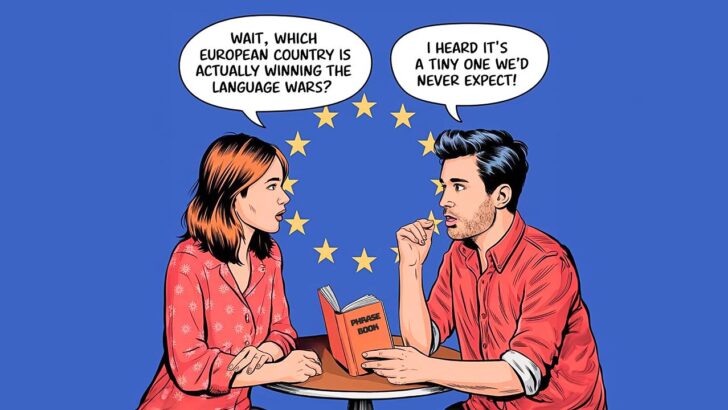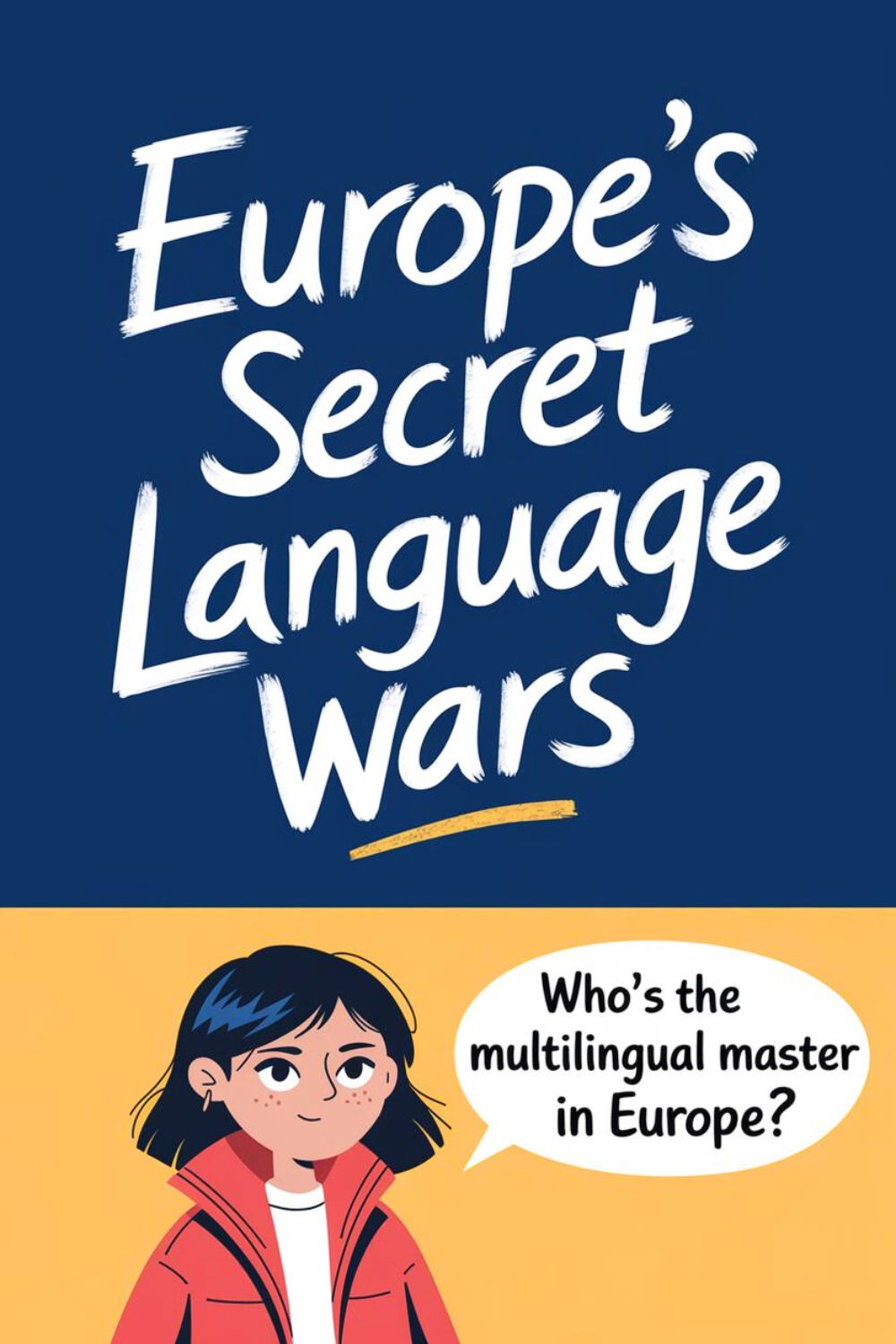Europe is a melting pot of languages, each battling for its place in the daily lives of millions. The “language wars” quietly unfold across the continent, from bustling cities to quaint villages. While some countries have soared to multilingual greatness, others still struggle to catch up.
What’s fascinating is that these battles aren’t fought with swords or shields but through schools, workplaces, and even living rooms. You might think English is the reigning champion, and you wouldn’t be entirely wrong – but there’s more to the story.
A recent survey by the European Commission involving over 26,000 respondents from across the EU reveals surprising trends in language skills and attitudes.
So, which country is mastering the art of multilingualism, and who’s trailing behind? Let’s break down the contenders to see who’s in the running to win Europe’s language wars.
The Players in the Language War
Some countries are clear leaders in this battle of words, showcasing impressive multilingual capabilities. The Netherlands and Sweden are serious contenders, boasting over 90% of their populations fluent in English. Their educational systems have a lot to do with this success. Learning English isn’t just encouraged; it’s practically a national hobby. With proficiency rates that rival native speakers, these countries have set a high bar.
Meanwhile, Spain, Finland, and Latvia are catching up fast. In recent years, there has been a significant boost in language learning, with more people taking up English, German, and other foreign languages. Their dedication is slowly pushing them up the rankings, giving top contenders a real run for their money.
But, not every country is faring so well. Poland and Romania are lagging, with less than half of their populations capable of speaking a foreign language. Limited exposure to foreign languages and less emphasis on language education seem to play a part in their struggles.
Then there are smaller nations, often overlooked, but quietly climbing to the top. With a blend of French, German, and English spoken fluently, one country in particular has been setting the gold standard for years – but more on that in a bit.
The Dominant Languages: Who’s Leading the Charge?
English holds a clear lead in the grand scheme of Europe’s language wars. Nearly half of Europeans (47%) claim to speak it well enough to converse, making it the go-to language for cross-border communication. This dominance is especially clear in countries like the Netherlands, Sweden, and Denmark, where an overwhelming majority speak English fluently. This widespread proficiency has turned English into a linguistic currency, allowing people from different backgrounds to connect seamlessly.
But English isn’t the only player. German and French maintain strong positions, especially in countries like Austria, Switzerland, and Belgium. In some places, economic influence plays a huge role – German is a sought-after language due to Germany’s status as Europe’s largest economy. Spanish is also gaining momentum, particularly among younger Europeans who see it as a key to travel and cultural exploration.
And let’s not forget the surprising declines in certain areas. Russian, once a significant second language in Eastern Europe, is losing its grip as English takes over in many countries. This shift underscores a changing Europe, where the “language wars” aren’t just about what people speak but how language shapes cultural identity.
The Factors Fueling the Language Wars
What’s driving this fierce competition for linguistic supremacy across Europe? Several key factors shape the language landscape, and they vary significantly from country to country.
First up is education. Countries with strong educational systems and policies promoting multilingualism, like Luxembourg and the Netherlands, naturally excel in the language wars. Learning a second (or even third) language is a standard part of the school curriculum in these nations. By the time students graduate, many are already fluent in English, German, or French. This early emphasis on language learning creates a population ready to thrive in a connected world.
Media consumption also plays a crucial role. English skills tend to skyrocket in countries where subtitled foreign films and TV shows are popular. Sweden and Denmark, for example, prefer subtitles over dubbing, exposing viewers to native English content. This daily practice helps boost language comprehension and fluency in ways that traditional classroom learning sometimes cannot.
Travel and tourism are other significant factors. Countries with many tourists or residents frequently traveling abroad, like Spain and Italy, often have stronger foreign language skills. Engaging with tourists and navigating different cultures gives locals a real-world incentive to pick up additional languages, whether it’s English, French, or German.
Lastly, economic opportunities drive language learning. Knowing another language is a valuable asset in countries with robust international business sectors. Germany’s strong economy makes German an attractive option for many, while the global nature of business gives English the upper hand in countries like Sweden, the Netherlands, and beyond.
But it’s not all rosy. Some countries face obstacles that hinder their progress in the language wars. Limited access to quality language education, cultural resistance to learning new languages, or simply the lack of everyday use can stifle a country’s multilingual growth. In Poland and Romania, for instance, these factors contribute to lower rates of foreign language proficiency.
Who’s Winning and Why?
So, who’s in the lead in Europe’s secret language wars? Several countries have their strengths, but only one truly stands out. Is it the Netherlands with its near-perfect English proficiency? Perhaps Sweden, where almost everyone seems fluent in multiple languages? Or maybe one of the rising stars, like Spain or Finland, finally securing their place at the top?
The answer may surprise you. The title of “Multilingual Master” goes to a small yet mighty nation: Luxembourg. With an astounding 99% of its citizens speaking at least one foreign language and many fluent in two or three, Luxembourg quietly dominates Europe’s linguistic battlefield.
Its blend of French, German, and English creates an environment that most nations can only dream of. Luxembourg’s approach to language learning from schools to workplaces sets the gold standard for multilingual excellence.
Hot on Luxembourg’s heels are the Netherlands, Sweden, and Denmark. These countries boast extraordinary English fluency, with over 90% of their populations speaking it confidently. How did they achieve this?
It’s a mix of early language education, media exposure to English content, and a cultural emphasis on the value of knowing multiple languages. English isn’t just a school subject; it’s woven into everyday life, from business meetings to social media interactions.
Meanwhile, countries like Spain, Finland, and Latvia are rising stars, showing rapid improvement in recent years. Their commitment to language learning and global connectivity’s increasing importance hint at potential rankings shifts in the coming years.
The Future of Europe’s Language War
What lies ahead in the battle of tongues? While English currently reigns supreme, the landscape of Europe’s language wars is ever-changing. The future will likely see some shifts in power as new trends and policies take hold.
With the European Union advocating for language diversity and multilingualism, countries are investing more in language education. This push could help level the playing field, particularly for those currently trailing behind, like Poland and Romania. The EU’s policy goal for every student to learn at least two foreign languages could spark a wave of change, promoting lesser-known languages alongside English.
However, economic factors and global connections will continue to influence language priorities. English will likely remain dominant given its status as the global language of business, travel, and online media. Yet, languages like Spanish, German, and French may be resurgent as people seek to expand their cultural and professional horizons.
The rise of technology is another game-changer. Apps, online courses, and even AI-powered translation tools make picking up a new language easier. Younger Europeans, already more inclined to learn languages, use these digital tools to boost their skills. This trend could further enhance multilingualism across the continent, with countries competing to adopt the best strategies for language learning.
But what will determine the future winners of Europe’s language wars? It comes down to adaptability. Countries that embrace a multilingual mindset, encourage language learning from an early age, and take advantage of modern tools will continue to lead. Those who fail to adapt risk falling further behind in an increasingly connected world.
In conclusion, Europe’s language wars are far from over. As cultural, economic, and technological forces shape the linguistic battlefield, the countries that adapt the fastest will secure their spot at the top. So, whether you’re from a multilingual hub like Luxembourg or a country striving to catch up, one thing is clear: language skills are the key to unlocking Europe’s future.

Hey fellow Linguaholics! It’s me, Marcel. I am the proud owner of linguaholic.com. Languages have always been my passion and I have studied Linguistics, Computational Linguistics and Sinology at the University of Zurich. It is my utmost pleasure to share with all of you guys what I know about languages and linguistics in general.


